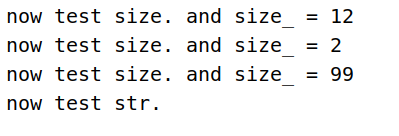c++笔记——explicit关键字
前言:
explicit是为了自定义类在初始化或赋值时,发生数据类型隐性强制转换为类类型。
特点:
1、只对单实参的构造函数有效
2、只能在类内声明构造函数是用explict,在类外定义时不写explicit
3、explicit的构造函数在生成对象时,只能用直接初始化,不能赋值
示例1:
class Test{ public: //explicit Test(int a); Test(int a); Test(string str); ~Test()= default; int size_; string str_; }; /* //explicit在类外定义构造函数时,会报错 explicit Test::Test(int a){ cout << "hello, this is testing..." << endl; size_ = a; } */ Test::Test(int a){ size_ = a; cout << "now test size." << endl; } Test::Test(string str) { str_ = str; cout << "now test str." << endl; } int main(){ Test t0(12);//直接初始化 Test t1 = 10;//赋值,实际上进行了隐式转换,将int型转换为Test类型 Test t2('c');//调用的是int 字符c对应的assic码 Test t3("jelly");//调用的是string return 0; }
示例2:加上explicit
#include<iostream> #include<vector> #include <string> using namespace std; class Test{ public: explicit Test(int a); //Test(int a); Test(string str); ~Test()= default; int size_; string str_; }; /* //explicit在类外定义构造函数时,会报错 explicit Test::Test(int a){ cout << "hello, this is testing..." << endl; size_ = a; } */ Test::Test(int a){ size_ = a; cout << "now test size. and size_ = " << size_ << endl; } Test::Test(string str) { str_ = str; cout << "now test str." << endl; } int main(){ Test t0(12); Test t12(2.3); //Test t1 = 10; Test t2('c'); Test t3("jelly"); return 0; }
这里t1报错,不能直接赋值,会发生类型转换

另外,关注到t12,t2这两个初始化操作,仍然发生了内置类型的隐式转换(float转换为int, char转换为int),即使有explicit,结果如下。

说明explicit只对自定义类型的强制转换有限制。
作者:水水滴答
本文版权归作者和博客园共有,欢迎转载,但未经作者同意必须保留此段声明,且在文章页面明显位置给出原文连接,否则保留追究法律责任的权利。




